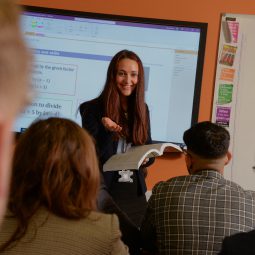Computer Science
Computer Science (AQA)
A Level Computer Science helps students understand the core academic principles of computer science. Classroom learning is transferred into creating real-world systems through the creation of an independent programming project. The course will develop the student’s technical understanding and their ability to analyse and solve problems using computational thinking. This course is essential if you are serious about a career in all aspects of computers.
Course Content & Assessment
This course is assessed in three modules.
Paper 1: Computer Systems
40% of A Level 140 marks
Written exam: 2 hours 30 minutes.
Students are introduced to the internal workings of the (CPU), data exchange, software development, data types and legal and ethical issues. The resulting knowledge and understanding will underpin their work in component 03.
It covers:
- The characteristics of contemporary processors, input, output and storage devices
- Types of software and the different methodologies used to develop software
- Data exchange between different systems
- Data types, data structures and algorithms
- Legal, moral, cultural and ethical issues.
Paper 2: Algorithms and Programming
40 % of A Level 140 marks
Written exam: 2 hours 30 minutes
This builds on component 01 to include computational thinking and problem-solving.
It covers:
- What is meant by computational thinking (thinking abstractly, thinking ahead, thinking procedurally etc.)
- Problem solving and programming – how computers and programs can be used to solve problems
- Algorithms and how they can be used to describe and solve problems.
Non-exam Assessment:
20% of A Level 70 marks
Students are expected to apply the principles of computational thinking to a practical coding programming project. They will analyse, design, develop, test, evaluate and document a program written in a suitable programming language. The project is designed to be independently chosen by the student and provides them with the flexibility to investigate projects within the diverse field of computer science. We support a wide and diverse range of languages.
Teaching
The course involves both theoretical and practical elements.
Teaching will involve a great deal of practical programming, especially when your programming skills are being developed, this will develop your skills for the Non-exam assessment.
Your Future
Possible careers include:
artificial intelligence, computational economics, intelligent interfaces, computer graphics, computational linguistics, privacy and security, robotics, data-management systems, networks, program languages, and machine learning and visualisation. Fashions can change in the technology, but one thing remains constant. Computers will always need to be programmed, and an understanding of these principles serve as a firm foundation whichever direction you choose to take in the future.
The Blue Coat Sixth Form is proud to be part of the Cranmer Education Trust
Cranmer Education Trust is a company limited by guarantee and an exempt charity registered in England. Company registration number: 07687709. Registered Office: Cranmer Education Trust, c/o The Blue Coat School, Egerton Street, Oldham OL1 3SQ. The website address is www.cranmereducationtrust.com and the phone number 0161 785 5082.









